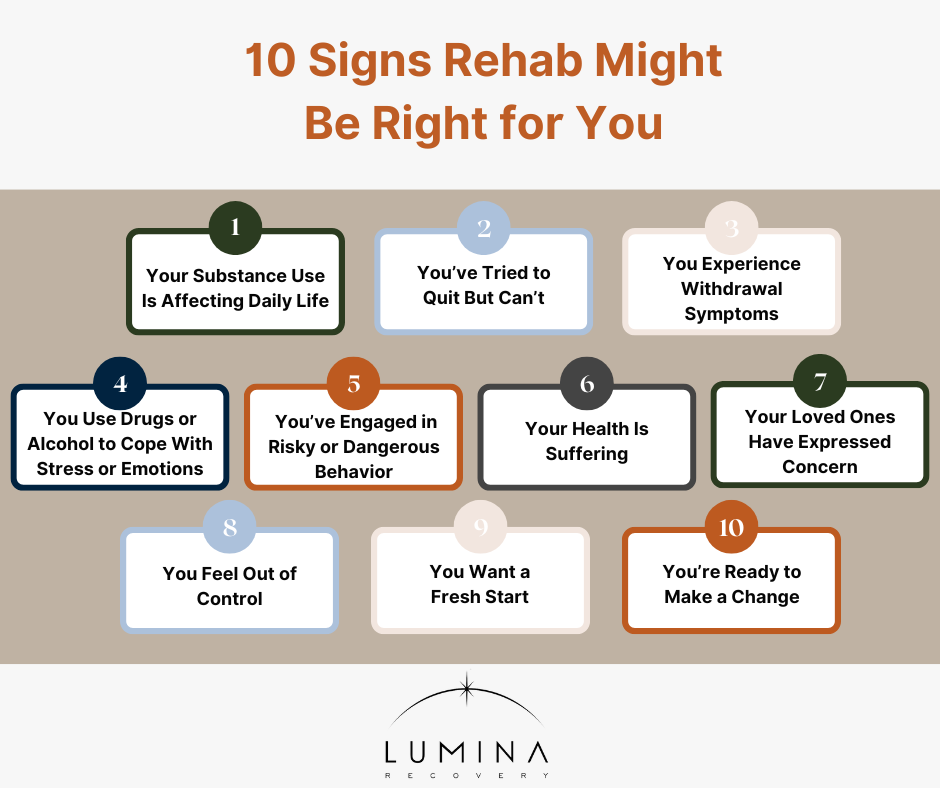Deciding whether rehab is the right step for you can feel overwhelming, but recognizing the need for help is a powerful first move toward recovery. If substance use is impacting your health, relationships, or daily life, professional treatment can provide the structure and support needed to break free from addiction.
Rehab is a chance to heal, rebuild, and develop the tools for lasting sobriety. Whether you’ve tried to quit on your own or are unsure of the next steps, understanding your options can help you make an informed decision about your recovery journey.
10 Signs Rehab Might Be Right for You
If you’re asking yourself, “Do I need rehab?” you’re already taking an important first step toward recovery. Many people struggle with recognizing the severity of their substance use, but there are clear signs that indicate professional help may be necessary. Below are key indicators that rehabilitation might be the right choice for you.
1. Your Substance Use Is Affecting Daily Life
A sign that you may need help with addiction is when your substance use starts interfering with work, school, or personal relationships. If you’re missing deadlines, struggling with responsibilities, or isolating yourself from loved ones, it could be time to ask, “Should I go to rehab?”
2. You’ve Tried to Quit But Can’t
Many people attempt to stop using drugs or alcohol on their own, only to relapse. If you’ve told yourself, “Maybe I need some rehab,” after unsuccessful attempts to quit or multiple relapses, it’s a strong indication that structured treatment could help you regain control.
3. You Experience Withdrawal Symptoms
One clear indicator is experiencing withdrawal symptoms like nausea, shaking, sweating, anxiety, or depression when you try to stop. Detoxing without medical supervision can be dangerous, which is why many people enter a rehabilitation program to safely navigate this process.
4. You Use Drugs or Alcohol to Cope With Stress or Emotions
If your addiction has become a way to deal with anxiety, depression, trauma, or other emotional struggles, it might be time to seek help. A rehab program not only addresses substance use but also provides tools to manage mental health challenges in healthier ways.
5. You’ve Engaged in Risky or Dangerous Behavior
Using substances can lead to risky decisions, such as driving under the influence, financial stress, or legal trouble. If your actions while under the influence have put you or others in danger, this might be the right time to go to rehab.
6. Your Health Is Suffering
Substance abuse takes a serious toll on physical and mental health. Chronic fatigue, weight loss, liver issues, heart problems, and declining mental well-being are reasons to go to rehab and address both addiction and overall health concerns.
7. Your Loved Ones Have Expressed Concern
It can be difficult to recognize your own struggles, but if family and friends have repeatedly encouraged you to get treatment, it’s worth considering their concerns. Support from loved ones can make rehabilitation more effective.
8. You Feel Out of Control
One of the biggest warning signs is feeling powerless over your substance use. If your addiction has reached the point where you can’t stop, no matter how much you want to, then seeking professional help is the best way to regain control of your life.
9. You Want a Fresh Start
If you’re thinking, “I need rehab,” you’ve already acknowledged that change is necessary. Rehab programs provide the structured support, therapy, and coping skills needed to rebuild your life and achieve lasting recovery.
10. You’re Ready to Make a Change
The decision to seek help for addiction is deeply personal, but if you’re feeling overwhelmed by substance use and want a healthier future, rehab can provide the support you need.
Acknowledging the need for change and saying “I need help with addiction” is a powerful first step, and professional treatment offers guidance, structure, and tools to help you regain control and build a fulfilling, sober life.
What to Expect in Rehab
Deciding to enter rehab is a major step towards recovery. Understanding what to expect can help ease any apprehensions and prepare you for the journey ahead.
- Assessment and Intake: Your journey in rehab begins with a comprehensive assessment. This process involves evaluating your physical and mental health, substance use history, and any co-occurring disorders. This information is crucial to designing a personalized treatment plan.
- Detoxification: If physical dependence is present, detox is often the first stage. This medically assisted process ensures your safety and comfort while your body clears itself of substances. Detox can involve managing withdrawal symptoms and may require medication.
- Therapy and Counseling: Central to rehab is therapy, both individual and group therapy. Therapies like cognitive behavioral therapy (CBT), dialectical behavior therapy (DBT), or other modalities help you understand the root causes of addiction, develop coping strategies, and build healthier behavioral patterns.
- Peer Support and Group Sessions: Sharing experiences and challenges with peers in rehab can be profoundly supportive. Group sessions foster a sense of community and understanding, offering different perspectives and mutual encouragement.
- Holistic Therapies and Activities: Many programs incorporate holistic therapies like yoga, meditation, art therapy, or physical fitness. These activities aim to improve overall well-being and provide healthy outlets for stress and emotions.
- Aftercare Planning: As your time in rehab concludes, the focus shifts to aftercare. This involves planning for continued support after leaving the facility, which may include outpatient therapy, support groups, or other community-based resources.
Entering rehab is a transformative experience that requires commitment and openness to change. While it can be challenging, it’s also an opportunity to rebuild your life with new skills and perspectives. Remember, every step in rehab is a step towards a healthier, more fulfilling life.
FAQs
Do I need to go to rehab?
If you’re questioning whether rehabilitation is the right step, consider how your substance use is affecting your life. If substance use is interfering with daily responsibilities or leading to negative consequences, rehab can provide the support needed for lasting recovery.
How do you know if you have an addiction?
A sign that you may need help with addiction is if you continue using substances despite negative effects on your health, work, or personal life. Other indicators include cravings, withdrawal symptoms, increasing tolerance, or using substances to cope with stress or emotions.
If you’re unsure, a professional assessment can help determine whether treatment is necessary.
What are the first steps to getting help?
The first step is reaching out to a professional for an assessment. They will evaluate your situation and recommend the most effective rehabilitation program. From there, you’ll begin treatment, therapy, and ongoing support for long-term recovery.
Take the First Step With Lumina Recovery
Choosing whether rehab is the right path can be a deeply personal and challenging decision, but recognizing the signs and exploring your options is a critical first step.
At Lumina Recovery, we offer inpatient and outpatient treatment programs tailored to your unique needs. Whether you need full-time care or a structured outpatient plan, we’re here to help you take the next step toward lasting recovery.
Contact us today to learn more about our personalized rehab programs and take the first step toward a healthier, substance-free life.




